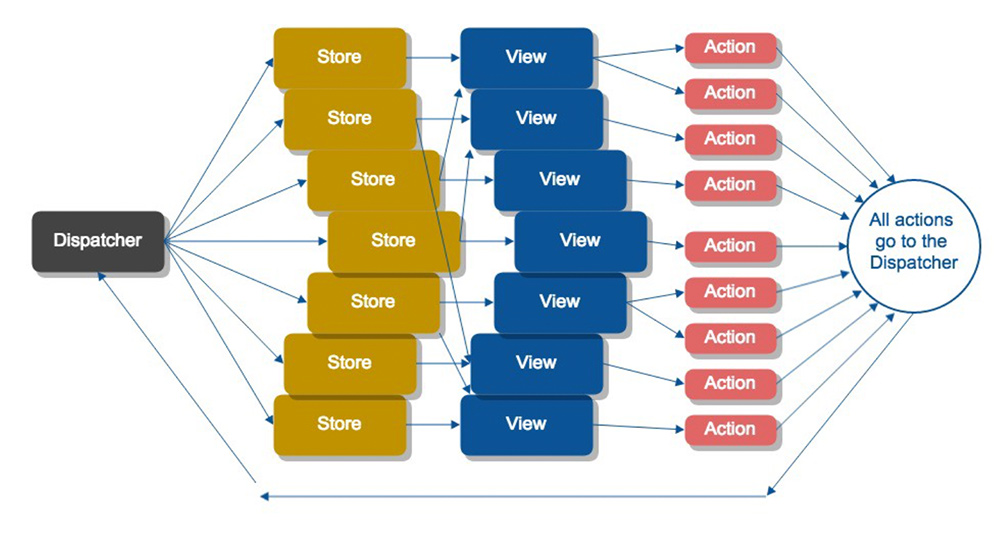从14年10月份,我们老大推荐我们开始关注react.js,以前自己也只是简单了解过这个库,现在看着国内外对它的关注度越来越高,那必须也是要学习下。
跟react.js名声相应的大概就是angular.js了,我们在14年有几个业务线都是基于angular.js在进行,遇到一个较严重问题是基于angular的组件不能达到理想中的通用性,另外angular带来许多非标准的条条框框的规则并不受人待见,同样在14年10月份angular官方公布了2.0的设计雏形、与1.x版本不兼容而且有非常大的变化,这些种种严重挫伤了我们专业前端对angular持续投入下去的决心。
另外angular的directive等东西,被react的设计者指责为「Inventing lots of new concepts (that already exist in javascript)」,事实也确实如此,因为angular的作者设计的2.x版本也将抛弃这些东西
但是,React的不鼓励使用双向绑定,这给处理表单数据和编辑表格数据带来了很多痛苦。虽然双向绑定不利于构建大型应用,但却对表单类应用来说仍然是比较方便的。
相对angular.js,基于react.js的代码更符合绝大多数专业前端的口味,也能更好的体现前端的专业性!接着,我们看看react都带来些什么呢?
- 组件化
- build components, not templates.
- use components to separate your concerns. With the full power of javascript, not a crippled templating language.
- components mixin markup and display logic.
- templates encourage a poor separation of concerns.
- display logic and markup are inevitably tightly coupled.
- display logic and markup are highly cohesive.
- templates separate technologies, not concerns.
- re-render the whole app on every update.
- the key design decision that makes react awesome.
- when data changes,React re-renders the entire component.
- re-rerdering on every change makes things simple.
- No magical data bingding. No more explicit dom operations-everything is declarative.
- 组件是被数据驱动的状态机。
- 虚dom
- 实现高性能render、re-render的核心工具
- unidirectional data flow(单向数据流)
- flux架构模式
- Flux keeps things predictable. (在Flux程序和MV*程序同样在内部都有很多事情在时刻发生, 但是Flux程序的可预见性却高得多)
- 据说:Flux is not simpler than MV*,但其实如果你实际应用flux去架构应用时,会发现它仍然是比较简单的,下面这张图就可完全形象说明。

react.js提倡「无模板,无数据绑定」,因为作者认为“传统的模板技术”并不能真正把职责和关注点分离,而数据绑定(特别双向绑定)带来许多混乱和不清晰。
它带来的虚拟dom,让人更加意识到实际dom的性能问题,它强调 the bottleneck is almost always the DOM mutation and not JS execution,但是dom性能为什么会这么差呢?有没有办法解决掉呢?这个也许只有那些做浏览器的最清楚~ 这里不禁又为 Web Components 担忧,它里边的新东西如: template、Custom elements、Shadow DOM 都是在dom里边呀,会不会有什么问题呢?虽然说只是当dom变化时会有性能问题。(后来看到阮老师翻译or自己写的 也许,DOM 不是答案,稍微感到震惊,这是大家想要抛弃dom的节奏呀!)
另外关于dom的性能问题:这个视频也是很好的解释。从这个react-vs-web-components论战中摘录出一个句话:
To sum it up: features from Web Components like templates, data binding or custom elements will have a lot of advantages over React but until the document object model itself gets significantly simplified then performance will not be one of them.
总之,dom的性能问题让人不能无视~
最后,是否想从angular等其他mv*框架转向react?别人给出一些理由可以借鉴。